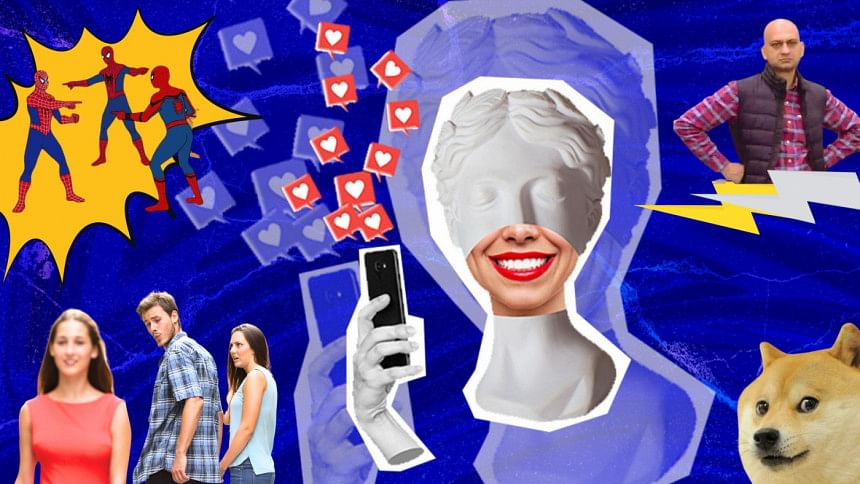An unlikely partnership: How internet humour is reshaping film marketing

In an era where attention spans are shrinking and social media dominates, film studios are turning to an unexpected ally in their promotional arsenals: memes. Once dismissed as mere online frivolity, memes have become a potent force in the marketing arsenals of production houses and streaming platforms worldwide. This shift is particularly evident in the burgeoning entertainment industry of Bangladesh, where meme marketing has propelled several productions to unexpected heights of popularity.

Meme marketing involves creating and sharing humorous, relatable content that can spread rapidly across social media platforms. For film projects, this often means crafting images or short videos that reference the movie in a way that resonates with online communities.
The appeal is clear: memes are shareable, adaptable, and can quickly go viral, potentially reaching millions of viewers at a fraction of the cost of traditional advertising. They also allow for a more organic, word-of-mouth style of promotion that can feel more authentic to younger audiences, who are often sceptical of conventional marketing tactics.

In the global arena, there are numerous examples of TV and film projects that have seen tremendous success with meme marketing. For example, the simultaneous release of "Barbie" and "Oppenheimer" in 2023 sparked the "Barbenheimer" phenomenon, a meme-driven marketing bonanza that boosted both films' profiles.
Take, for instance, the last Valentine's Day special release– Shihab Shaheen's directorial web-film "Kacher Manush Dure Thuiya". What began as a modest release quickly snowballed into an online cultural phenomenon, driven largely by a flurry of memes that flooded social media platforms. These bite-sized pieces of humour, often featuring stills or short clips from the film overlaid with witty captions, did more than just amuse – they intrigued. Viewers, including this author, found themselves drawn to watch the film; if only to understand the context behind the memes that had become ubiquitous in their social media feeds. This curiosity-driven viewership represents a new paradigm in audience engagement, one where the line between marketing and entertainment is increasingly blurred.

Sheikh Korashanee from Chorki, one of the spearheads behind the OTT platform's strategists, provides insight into how this meme marketing approach evolved. "It all started with 'Syndicate'," Korashanee explains. "We found the character Allen Swapan intriguing, made a few memes based on him, and launched them from our house. It became a hit, leading to a significant increase in the series' engagement."
This initial success laid the groundwork for their future meme marketing strategies. For Chorki's another project, "Myself Allen Swapan", a spin-off series of "Syndicate", the OTT platform hosted a meme competition in partnership with Rantages, a popular Bangladeshi meme-sharing platform. The result? An astounding two crore minutes of viewership in just eight days, setting a new record for the streaming platform.

Rumman Kalam, the founder of Rantages, sheds light on the mechanics behind this success. "The first step is for OTT platforms to reach out to us for their new releases, which Chorki did last year," Kalam explains. "And then we coordinate with them to make the content." This collaboration allows for the creation of timely, relevant memes that are ready for deployment as soon as the content is released. It's a strategy that extends the lifespan of promotional content far beyond traditional marketing methods.
Korashanee elaborates on their process, explaining, "Upon finalisation of a project, we provide the meme platform with around 15-20 templates, and then memes are made, adding a variety of contexts to those templates." This collaborative approach comes in response to the meme platform's active cooperation in ensuring the well-timed dispensation of readily formed memes across social media platforms.

The genius of meme marketing lies in its ability to circumvent the limitations of traditional social media promotion for audio-visual content. While platforms typically restrict the sharing of clips from streaming services, memes offer a workaround. "Memes allow us to reuse the same clip multiple times and keep the content at the top of our minds," Kalam notes. This repetition, far from being monotonous, keeps the production firmly in the public consciousness, driving continued interest and viewership.
However, the path to meme marketing success is not without its pitfalls. The rapidly changing nature of internet culture means that what's viral today may be passé tomorrow. Cultural sensitivities must be navigated carefully, as a meme that misses the mark can quickly backfire, generating negative publicity. Moreover, as Kalam candidly admits, "Over the years, Rantages worked with many campaigns, but success wasn't always a guarantee."
Budget constraints also play a significant role in the adoption of meme marketing. Traditional production houses often lack the resources for extensive marketing campaigns. This financial limitation has, paradoxically, fueled the rise of meme marketing as a cost-effective alternative. It's a strategy that aligns perfectly with the needs of emerging streaming platforms and independent productions, allowing them to compete for attention in an increasingly crowded media landscape.

Looking to the future, the integration of meme marketing into film and series promotion strategies seems set to deepen. We may see the emergence of AI-generated memes, tailored to individual viewer preferences or interactive meme experiences that blur the line between promotion and content. There's even speculation that the popularity of memes might influence content creation itself, with writers and directors crafting scenes with "meme-ability" in mind.
As the entertainment industry continues to grapple with changing viewer habits and the dominance of social media, meme marketing stands out as a uniquely 21st-century solution.
In Bangladesh and beyond, the success of productions like "Kacher Manush Dure Thuiya" and "Myself Allen Swapan" suggests that meme marketing is more than just a passing trend. It represents a fundamental shift in how audiences interact with and share content. As the digital landscape continues to evolve, those in the film and streaming industry who can master the art of the meme may find themselves with a significant advantage in capturing the ever-elusive attention of modern viewers.
Ultimately, the future of film promotion via meme marketing is bright, but it requires a delicate balance of creativity, cultural awareness, and technological savvy. When done right, meme marketing has the power to turn a modest production into a cultural phenomenon. In the coming years, we can expect to see this approach refined and expanded, potentially revolutionising the way films and series are promoted in the digital age. In this new landscape, the next viral sensation could be just one clever meme away.

 For all latest news, follow The Daily Star's Google News channel.
For all latest news, follow The Daily Star's Google News channel. 










Comments